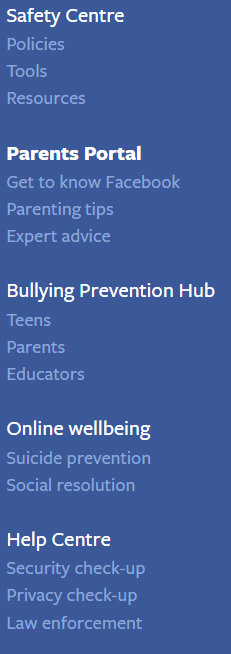FACEBOOK LAUNCHES THE FACEBOOK PARENT PORTAL TO HELP FOLKS GUIDE THEIR WARDS’ SOCIAL EXPERIENCE

Facebook Parent′s Portal
The social networking application used by 1.8 billion persons globally has no data on what percentage of its users are minors. But with the rate at which the application is growing, there’s a huge chance it’s a significant number. Proactively, Facebook has launched a new Facebook Parent Portal. The portal is designed to help adults navigate their minor charges through Facebook’s social media landscape.
To be clear, this is not a portal designed to give parents access into what their wards want out of the world or Facebook either; or give them a way to monitor or delete their kid’s accounts. Instead, it is a set of safety guidelines and resources designed to help first-time Facebook users. The platform can be used positively and safely by minors.
The Facebook Parent Portal is under the Safety section of Facebook (right under the guidelines for coping with online bullying). The portal includes basics such as how to register on Facebook for the first time, post on your timeline and import contacts. It also includes basic safety tips such as how to create secure passwords, block content and report content. It also provides links to report accounts held by those under 13 years of age.
There’s also a section of tips to help parents figure out how Facebook fits into the wider world of parenting dos and don’ts and general online safety. Lastly, there are links to internet advocacy groups focused on shaping and carrying out policies related to children online. The parenting portal is very much inclusive. It is available in over 50 languages which shows that Facebook is looking to garner support from across the world.
GETTING TO KNOW FACEBOOK
This section of the Facebook Parent Portal includes tips on how to sign up to the site, find friends, and post and share content. It also includes some education on how Facebook Ads work. Just like advertising on television, children have to be taught how ads work on Facebook. Facebook Ads help businesses connect with those who are most likely going to be in need of their services. Your kids can control the ads they see by clicking the x in the upper right corner of those ads which don’t interest them. They can also prevent their social actions from being linked to ads by changing their ad settings.
Additionally, In line with Facebook’s goal to make their users feel safe, there are certain community standards and related policies. These are aimed at finding the right balance between providing a platform for people to express themselves freely and promoting a safe and welcoming environment. The platform gives people control over the content they share, who they share it with, and what they see. There are also courses available to teach people how to use the platform safely and responsibly.
The policies on Facebook include establishing community standards, monitoring for underage accounts and giving people control over their own experiences. The tools which are available to control what appears on the wards profile or timeline include blocking, following, unfollowing, unfriending and reporting tools.
PARENTING TIPS
Technology has changed the way people communicate. But at the family level, the basics of talking to children about safety remain the same. Below are a few tips available on Facebook’s parent portal. Parents will find it useful when speaking to their children on online safety. They include:
- Letting your child be aware that the same rules apply online as apply offline. They shouldn’t take advantage of the relative anonymity provided by Facebook to engage in dangerous activities. They should be taught to think before they share anything online.
- Also, using Facebook wisely as a parent as more often than not, your kids will do as you do and not as you say (without doing).
- Begin teaching your kids about technology and social media as early as possible.
- Identifying and seizing key moments to teach your kids about the use of Facebook and other social media platforms.
- Trusting yourself to establish the level of control you exercise on your kid’s online activities as you do for their offline activities.
EXPERT ADVICE
There is also an obvious connection with advocacy groups and safety experts from across the world. These groups offer resources to parents in their local languages. Currently, this service is available in over 55 languages.


